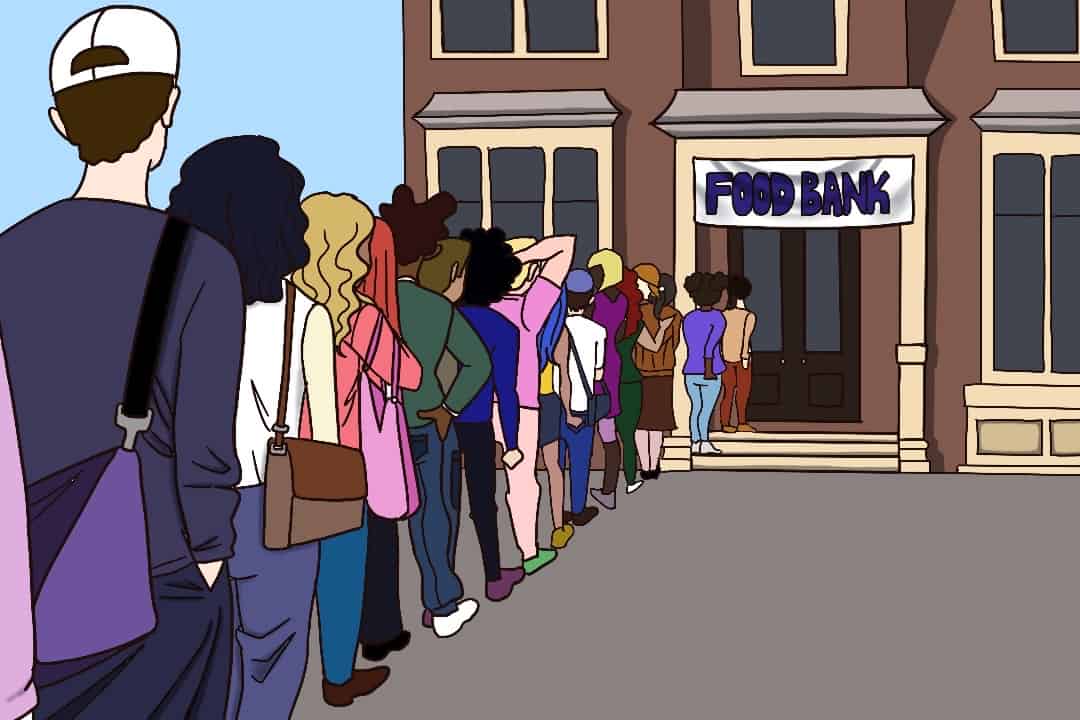Almost 60 people utilize the University of Toronto Students’ Union’s (UTSU) food bank every week, with the majority of the individuals being graduate students — that’s according to UTSU VP Finance and Operations Samir Mechel.
Despite constituting a smaller portion of the total student population, the high rates at which U of T graduate students utilize the UTSU food bank reflect the broader issue of food insecurity among them. Other universities — such as Queen’s, according to a recent analysis by Global News — are also witnessing a rise in food insecurity among its graduate student populations.
Furthermore, food centres run by all tri-campus undergraduate student unions have witnessed a significant uptick in demand for food. A recent study by BMC Public Health, a peer-reviewed scientific journal, also found that 56.8 per cent of all Canadian students experienced moderate or high food insecurity as of 2021. The UTSC Feeding City Lab found that marginalized students, especially BIPOC, international, and low-income students, tend to experience greater levels of food insecurity.
With rising concerns about the prevalence of graduate student food insecurity, the University of Toronto Graduate Students’ Union is working on a variety of new initiatives in the coming months aimed at not only understanding the extent of the issue but also finding feasible ways to address it.
How did we get here?
National organizations such as the Canadian Institutes of Health Research, Natural Sciences and Engineering Council, and the Social Sciences and Humanities Research Council provide grants and funding to graduate students, with masters students receiving up to $17,500 and PhD students receiving up to $21,000 through such organizations. Such funding packages aim to help mitigate financial burdens for graduate students by covering basic expenses such as food and reducing the need to take on additional jobs, instead allowing students to focus on their studies and research.
However, the amounts granted have not increased since 2003, while the Ontario Consumer Price Index — a measure of how much the price of an average basket of goods has increased in the province — shot up to 158.4, as of June 2023. This reflects an increase of almost 20 points since June 2020.
In an interview with CBC News, Nancy Forde, a professor at Simon Fraser University, said that it’s difficult for graduate students to live with the current funds they receive, noting that many have to use food banks to survive. She further raised concerns about how low funding amounts could harm Canadian academic research as the cost of living increases, forcing more students to leave academia and research.
In May 2023, hundreds of U of T students and staff participated in a walkout at the St. George campus to protest low pay. The participants called on the federal government to provide more funding for scholarships, fellowships, and grants for graduate students and postdoctoral researchers.
Moving forward
Nicholas Fast, a PhD candidate in the Department of History, introduced a petition last year encouraging federal government support in increasing funding to reflect the current financial realities of living in the city.
In an article for Ultra Vires, U of T’s Faculty of Law paper, Vivienne Stern, a U of T law student, argues that U of T should compile data on the demographics of people who are accessing food banks on campus. One way this can be done is through surveys and voluntary disclosures. Stern also argues that it is essential that the university also pursue partnerships with local community organizations to fund and support food security initiatives.
The UTGSU has also considered various solutions. In an email to The Varsity, Mohammadamir (Amir) Ghasemian Moghaddam — vice president, academics for divisions 3 and 4 — wrote that the union is “currently evaluating several initiatives, including a food bank, communal kitchens, and affordable food options, to address this critical issue.” He wrote that the union has also built partnerships with charities, municipal and provincial food banks, farmers, and food preparation companies, as well as staffed student spaces that can be used in the future.
While such initiatives are still under development, the UTGSU also plans to launch a survey to collect data on the extent of food insecurity by summer 2024.
Meanwhile, the UTSU Food Bank accepts food donations and also provides summer 2024 volunteer opportunities, with recruitment beginning in April. Many local food banks that students frequent also often require volunteers.
The UTSU operates the food bank every week on Fridays in Room 136 of the UTSU Student Commons from 11:00 am to 3:00 pm. Students hoping to access the food bank’s services can book an appointment slot on the UTSU official site.



No comments to display.